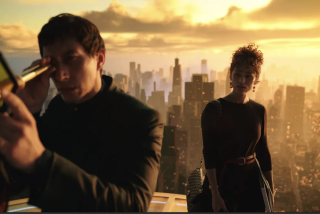He’s a behind-the-scenes stealer
- Share via
At a time when the offspring of many acclaimed Hollywood directors -- with last names such as Reitman, Redford, Eastwood and Kasdan -- are directing features of their own, one scion of filmmaking has become more active by stepping back from the spotlight.
The 42-year-old son of Francis Ford Coppola, Roman Coppola wrote and directed the 2001 feature “CQ,” but he has stayed busy going even deeper behind the scenes, working as second-unit director on all three features by his sister Sofia, as well as on “The Life Aquatic With Steve Zissou” for filmmaker Wes Anderson.
On Anderson’s latest film, “The Darjeeling Limited,” besides his second-unit credit, Coppola was also a co-writer (with Anderson and cousin Jason Schwartzman) and a producer. On “Youth Without Youth,” the first feature directed by Francis Ford Coppola in 10 years, Roman Coppola again worked as second-unit director, a role he has filled for his father since “Bram Stoker’s Dracula” in 1992.
“I know the value of someone being on your team and not trying to bring another agenda to the table, really serving your needs,” Roman Coppola said during a recent interview. “I understand the function, so it’s not an issue.”
Part of Coppola’s attitude, his seeming lack of anxiety over the things that typically drive folks in the film industry crazy, may come from the fact that he has so many other pursuits outside the strict confines of feature filmmaking.
He has been involved with a label, RC Reserve, at his father’s winery. He frequently shoots music videos and commercials, and he co-founded the production company the Directors Bureau. He has a number of other entrepreneurial ventures and inventions as well, including a patent-pending photographic device called the Photobubble.
All of which makes him into something like the hipster’s hipster, the ultimate connoisseur. Surrounded by a coterie of creative people, his family and his friends, Coppola seemingly leads an enviable life as a jet-set bon vivant.
While he allows that he wants to make another feature film of his own, until he settles on just the right script he is happy to stay busy and productive with whatever project catches his immediate interest.
It is that sense of rambling, wide-ranging inquiry, a desire to do and know more, that is perhaps the unifying factor across Coppola’s many endeavors.
“I’ve had a very diverse background,” he said, “where I’ve worked professionally in many, many jobs. I think it’s just part of my nature to be interested in different things and to just sort of follow my instincts. I love diversity and a sense of adventure, and satisfying my curiosity and learning about stuff.”
Typically, a second-unit handles shots that don’t involve the principal actors, from action sequences to pickup shots. Not so when the title is assumed by Coppola, who instead serves a variety of functions as facilitator and multipurpose problem solver. “He’s more than a second-unit director; he’s a trusted secret weapon” is how Francis Ford Coppola describes the on-set role Roman Coppola plays on his productions.
“Youth Without Youth,” based on a novella by Mircea Eliade, is a twisting, complex story of an elderly man (Tim Roth) who regains his youth after being struck by lightning. The idea of transference between old and young seems particularly apt in light of the Coppolas’ own father-son collaboration.
“I think the difference between Roman and what you would normally call second-unit is that he is very comfortable working with the main actors,” said Francis Ford Coppola. “He understands what I’m trying to do without words, and I know Sofia feels that way with him. I can send Roman out there and I know that he’ll just get exactly what I would have gotten. Quite frankly, if . . . I got run over by a truck, Roman could finish the movie.”
Anderson, who met Roman Coppola through a mutual friend and worked with him initially on “The Life Aquatic,” had similar words of praise.
“He just sort of knew when he ought to appear” is how Anderson recalled their first collaboration. “When he showed up he said, ‘Is there anything I can do tomorrow?’ ‘Tomorrow? Yeah. You can get a helicopter and shoot this shot we need.’ Just by being there, suddenly it became clear to me what things we needed.”
For “The Darjeeling Limited,” Anderson, Schwartzman and Coppola began writing while all three were in Paris. As part of their writing process, the trio went on trips together -- “reconnaissance missions” Anderson called them -- that took them through Europe, India, the Himalayas, New York and Los Angeles. When it came time to actually shoot the film, on a train in India, Anderson was directing, Schwartzman acting and Coppola producing and shooting second-unit.
“For me, ‘Darjeeling’ is as much Roman’s movie as anybody else’s,” Anderson said. “Even though he’s not the director of the movie, I don’t see him in a supporting kind of role because the three of us, it’s our film.”
More to Read
Only good movies
Get the Indie Focus newsletter, Mark Olsen's weekly guide to the world of cinema.
You may occasionally receive promotional content from the Los Angeles Times.











